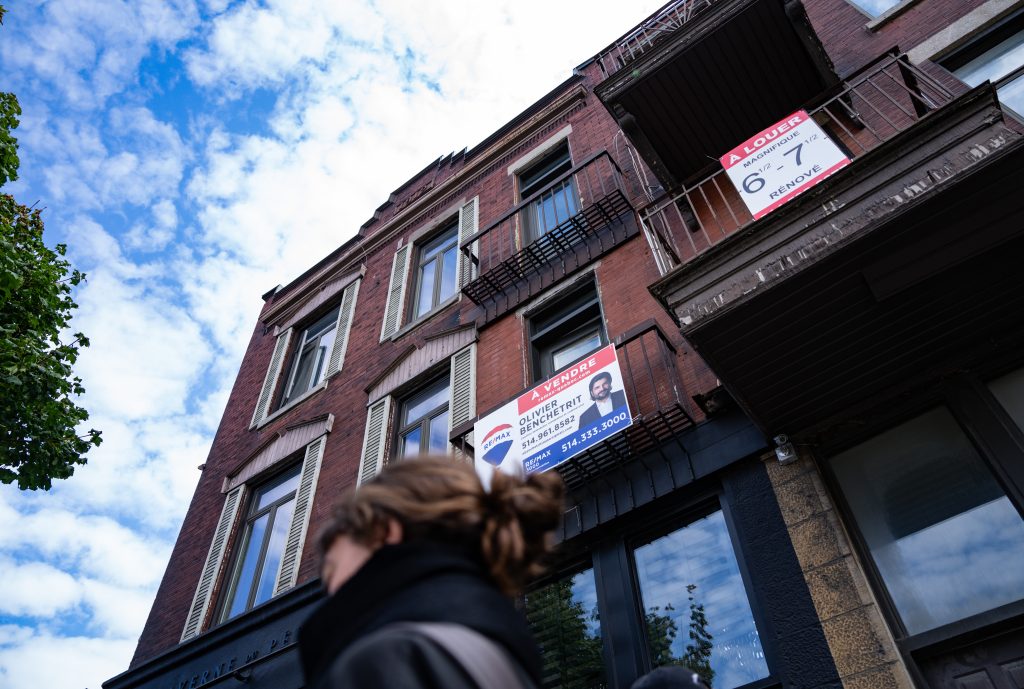Different levels of government in Quebec receive C+ grading in housing report card

Posted December 27, 2024 11:34 am.
Last Updated December 27, 2024 11:54 am.
For the second year in a row, the Association des professionnels de la construction et de l’habitation du Québec (APCHQ) has provided the various levels of government in Quebec with their 2024 report card on housing.
With the C+ grade, the APCHQ wants to recognize some of the progress made by governments to promote access to homeownership and support the sector, but also to remind them that many challenges persist.
While the APCHQ gave them a C- last year, its Vice-President, Strategic Development, Public Affairs and Innovation, Isabelle Demers, notes a quiet recovery in the real estate sector and improving market conditions in Quebec.
Despite these modest improvements, access to homeownership remains very difficult for an entire generation and housing starts remain insufficient to meet needs and demand while restoring affordability.
“Governments will have to continue their efforts so that construction starts are essentially done more quickly, but also that they are quality constructions so that it can also be done sustainably,” explained Demers in an interview with The Canadian Press.
She welcomes several actions taken in the last year that will allow the more than 1,100 Quebec municipalities to be more agile and flexible in issuing permits or in the appropriate zoning to facilitate housing projects.
Despite the new powers granted to municipalities, Demers deplores that these “seem to be underused and sometimes even unknown” by the Cities.
“We are touring Quebec, we are meeting several mayors of these municipalities and they are not all aware of these superpowers, many have not had to use them and sometimes some do not dare to use them, so it remains something that will have to be put in place,” she indicated.
For Demers, the “immense challenge” of insufficient infrastructure remains in Quebec and this prevents densification, because it is then impossible to connect new projects to the existing network. According to her, it will be necessary to invest $48 billion in the coming years in Quebec to be able to maintain existing infrastructure and be able to build more.
However, the APCHQ congratulates Ottawa for its efforts on market conditions and assistance to municipalities with regard to infrastructure, then the Quebec government for its assistance to municipalities and on non-market housing. However, Demers deplored that repeated requests to exempt new rental properties from the QST have gone unheeded by Quebec.
“This is something that would help, because if we think that housing is an essential good, maybe it shouldn’t be taxed,” explained Demers. “It’s a significant tax on substantial amounts, so we would like the government to be able to act on the QST.”
Quadruple housing starts by 2030
For Demers, there is no doubt that there is still a shortage of “too many homes” given the need for 1.2 million homes by 2030. She emphasizes the need to increase housing starts for all housing categories and not just for the construction of off-market housing.
“At the rate we’re going, we won’t be able to meet our objectives, that’s for sure,” indicated Demers. We need to build 1.2 million homes by 2030 (…) the improvement is there, we can see it, there is an appreciation that is being made, but the difference is too great, we would have to quadruple construction starts by 2030 to restore affordability.”
“There is an awareness and that is very good, but now we must continue all efforts so that projects can be done, so that they can be connected and that they arrive quickly, because the faster a project is done and built, the less risk there is of cost overruns.”
Beyond construction starts, it is the maintenance of the built heritage that would require more attention according to Demers.
“We cannot afford to lose housing, because it is dilapidated,” she explained. She deplores the lack of incentive for renovation when the need is felt.
The APCHQ also hopes that governments will mobilize more in 2025 for the middle class for whom access to property is difficult due to lack of affordability or for whom new constructions are inadequate.
–This report by La Presse Canadienne was translated by CityNews








